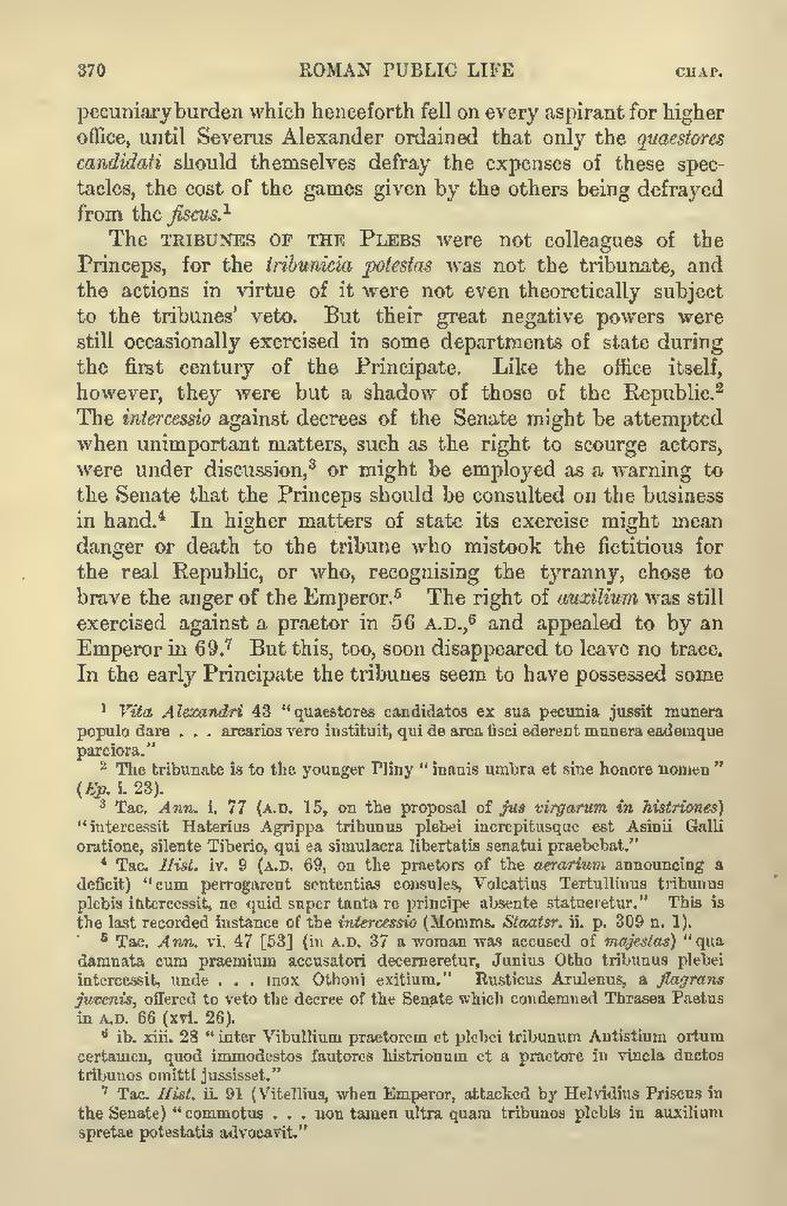pecuniary burden which henceforth fell on every aspirant for higher office, until Severus Alexander ordained that only the quaestores candidati should themselves defray the expenses of these spectacles, the cost of the games given by the others being defrayed from the fiscus.[1]
The tribunes of the Plebs were not colleagues of the Princeps, for the tribunica potestas was not the tribunate, and the actions in virtue of it were not even theoretically subject to the tribunes' veto. But their great negative powers were still occasionally exercised in some departments of state during the first century of the Principate. Like the office itself, however, they were but a shadow of those of the Republic.[2] The intercessio against decrees of the Senate might be attempted when unimportant matters, such as the right to scourge actors, were under discussion,[3] or might be employed as a warning to the Senate that the Princeps should be consulted on the business in hand.[4] In higher matters of state its exercise might mean danger or death to the tribune who mistook the fictitious for the real Republic, or who, recognising the tyranny, chose to brave the anger of the Emperor.[5] The right of auxilium was still exercised against a praetor in 56 A.D.,[6] and appealed to by an Emperor in 69.[7] But this, too, soon disappeared to leave no trace. In the early Principate the tribunes seem to have possessed some(in A.D. 37 a woman was accused of majestas) "qua damnata cum praemium accusatori decerneretur, Junius Otho tribunus plebei intercessit, unde . . . mox Othoni exitium." Rusticus Arulenus, a flagrans juvenis, offered to veto the decree of the Senate which condemned Thrasea Paetus in A.D. 66 (xvi. 26).]
- ↑ Vita Alexandri 43 "quaestores candidatos ex sua pecunia jussit munera populo dare . . . arcarios vero instituit, qui de arca fisci ederent munera eademque parciora."
- ↑ The tribunate is to the younger Pliny "inanis umbra et sine honore nomen" (Ep. i 23).
- ↑ Tac. Ann. i. 77 (A.D. 15, on the proposal of jus virgarum in histriones) "intercessit Haterius Agrippa tribunus plebei increpitusque est Asinii Galli oratione, silente Tiberio, qui ea simulacra libertatis senatui praebebat."
- ↑ Tac. Hist. iv. 9 (A.D. 69, on the praetors of the aerarium announcing a deficit) "cum perrogarent sententias consules, Volcatius Tertullinus tribunus plebis intercessit, ne quid super tanta re principe absente statueretur." This is the last recorded instance of the intercessio (Momms. Staatsr. ii. p. 309 n. 1).
- ↑ Tac. Ann. vi. 47 [53
- ↑ ib. xiii. 28 "inter Vibullium praetorem et plebei tribunum Antistium ortum certamen, quod immodestos fautores histrionum et a praetore in vincla ductos tribunos omitti jussisset."
- ↑ Tac. Hist. ii. 91 (Vitellius, when Emperor, attacked by Helvidius Priscus in the Senate) "commotus . . . non tamen ultra quam tribunos plebis in auxilium spretae potestatis advocavit."
